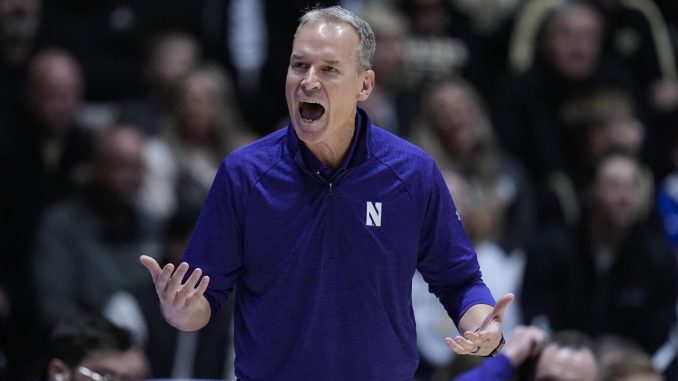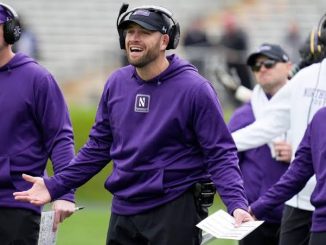
Northwestern Wildcats Men’s Basketball Head Coach Chris Collins Talks Racism Within the Program
In a powerful and candid discussion, Northwestern Wildcats men’s basketball head coach Chris Collins has opened up about his experiences and the ongoing issue of racism within the program and broader athletic community. Collins, who has served as the head coach of the Wildcats since 2013, spoke about his commitment to creating a more inclusive environment, addressing issues of racial inequality, and fostering a culture of respect both within his team and throughout the university.
A Bold Acknowledgment of Challenges
In an exclusive interview with reporters, Collins, who is entering his 12th season at the helm of the Wildcats, acknowledged the challenges that racism and discrimination have posed for his players and staff. “As a coach, it’s my job to not only develop players on the court but also to help them navigate the world off the court,” Collins said. “Racism is real, and we can’t pretend it doesn’t exist—whether it’s in our locker rooms, on campus, or in the broader society.”
Collins shared how he has worked to create a safe space for his players to express their concerns, noting that the topic of race is something that is regularly addressed within the team. “We have open conversations. We talk about race, identity, and the obstacles that our players face—not just in basketball, but in their daily lives. This isn’t just a basketball issue; it’s a societal one.”
Conversations About Race and Culture
Coach Collins, who is white, emphasized the importance of not only listening to his players but also learning from their experiences. “I’ve learned so much from my players, especially the Black student-athletes on our team,” Collins admitted. “It’s important for me, as their coach, to understand their realities. That means being willing to listen, learn, and help address these issues—whether it’s racism within the program or how they experience it on a daily basis.”
This acknowledgment comes after multiple high-profile instances of racial discrimination have been brought to light at various college athletics programs across the country. Collins stressed that these challenges are not unique to Northwestern but are widespread issues within the collegiate sports world. Still, he asserted that it is incumbent upon all coaches, administrators, and athletes to actively work toward a culture of inclusion and respect.
“Having honest discussions about racism is uncomfortable, but that discomfort is necessary,” Collins added. “The more we talk about it, the more we can begin to address the deep-seated issues that exist in our society and in our programs. Our goal is to ensure that every single player feels seen, heard, and respected.”
Action Beyond Words
While Collins has been vocal about the need for change, he is also taking concrete steps to combat racism within the basketball program. Under his leadership, the Wildcats have implemented initiatives aimed at fostering diversity, equity, and inclusion. This includes partnerships with local community organizations, educational workshops for players, and encouraging players to take leadership roles in advocating for social justice.
Collins also emphasized the importance of recruiting a diverse group of student-athletes, ensuring that the program reflects the broader community. “It’s not just about talking; it’s about action. We want to make sure that every player feels valued, and part of that is creating a diverse team and a culture that celebrates that diversity.”
The Wildcats have also been involved in broader campus-wide efforts at Northwestern University, working with university leaders to improve racial equity across the athletic department and the entire student body. Collins pointed to the university’s recent initiatives to improve diversity in hiring practices and increase support for underrepresented groups as steps in the right direction.
Impact on the Team and Community
The impact of these conversations and initiatives has already begun to resonate within the program. Several players, including Black student-athletes, have expressed appreciation for the culture Collins has helped cultivate. “Coach Collins has really helped us feel comfortable talking about race,” said one anonymous player. “It’s not always easy, but having those discussions has helped me feel more confident in myself and my teammates. He’s shown that he cares, not just as a coach, but as a person.”
Additionally, many Wildcats players have used their platform to speak out on issues of racial injustice, with some actively engaging in community outreach and social justice advocacy. “As athletes, we have a responsibility to speak up,” said another player. “Coach Collins has empowered us to do that, and it makes a difference. We know he has our backs, and that’s huge.”
Looking Ahead: Continued Commitment to Change
Chris Collins’ comments highlight a growing recognition that racism cannot be swept under the rug or ignored within collegiate athletics. His willingness to engage in uncomfortable but necessary conversations is a step toward a broader cultural shift, not only within Northwestern but also within the landscape of college basketball.
While progress has been made, Collins made it clear that the work is far from over. “This is an ongoing process. Change doesn’t happen overnight, but we are committed to doing the work to make sure that every player in our program, regardless of race or background, feels supported and valued,” he said. “Racism has no place in our program, and we will continue to fight to make sure it doesn’t have a place at Northwestern or in the world.”
As the Wildcats prepare for the upcoming season, the conversation around race and inclusion will remain a central focus—both within the locker room and beyond. The hope is that these discussions will not only impact the players and coaching staff but will also reverberate throughout the broader athletic community, inspiring other programs to take similar actions in the fight against racism.
For Coach Chris Collins, the fight for racial equity in sports is just beginning, but his leadership stands as an important model for creating a more inclusive future in college basketball.

Be the first to comment